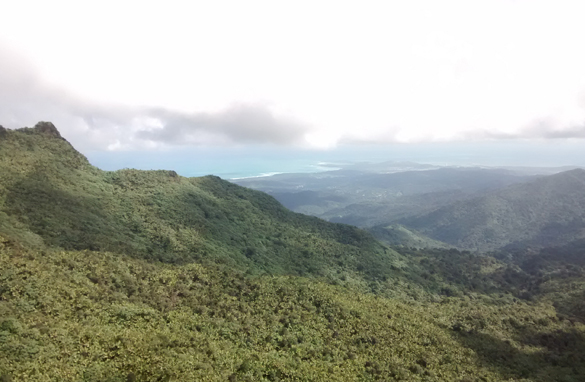Extreme rainstorms drive exceptional organic carbon export from forested humid-tropical rivers in Puerto Rico

New research published by Dr Kasey Clark has appeared in the prestigious journal Nature Communications. Kasey and the author team show that Extreme rainfall in Puerto Rico leads to some of the highest particulate organic carbon yields (https://doi.org/10.1038/s41467-022-29618-5). This fully Open Access paper shows that the author's found that global estimates of carbon export may be underestimated by up to 9% because of a lack of studies in the tropics.
Dr Kasey Clark researches the carbon cycle, and this work focuses on quantifying river carbon fluxes in tropical rivers. Rivers are important within the carbon cycle, especially the long-term geological carbon cycle. To understand how climate is changing in the long-term, it's important to improve the accuracy of the various components of the long-term carbon budget. Tropical rivers are very important within the carbon cycle, because they play a disproportionally large role for the total global area they cover because of high rainfall and extreme rainfall events, high erosion rates, and high biomass to erode from the landscape. The paper focuses on the understudied wet tropical catchments with a particular type of geology. Most river studies have focused on catchments with inputs from petrogenic organic carbon sources. Whereas here, they found however that there are distinct relationships between global rivers with or without petrogenic organic carbon sources. As such, wet tropical mountain islands with volcanic/igneous bedrock are important geological carbon sinks. They only contain carbon sinks, which are: silicate weathering consuming atmospheric CO2 and river particulate organic carbon (POC) with burial in long-term ocean deposits.
The research focused on two rivers in Puerto Rico in the Luquillo Mountains and estimated river carbon yields for 25 years incorporating over 4000 river samples, collected over discharges spanning four orders of magnitude. The findings were that these catchments are important geological carbon sinks, in part because they have some of the highest particulate organic carbon yields in the world. During extreme rainfall events (> 92 mm/event) these rivers export > 50% of their annual POC yield. Through this work, the team demonstrated that global estimates of biogenic organic carbon export from terrestrial ecosystems may be underestimated by up to 9% within the long-term carbon cycle because of a lack of research on tropical rivers with little to no petrogenic organic carbon bedrock.
In the future, as a new Lecturer in Environmental Change, joined March 2022, in the Department of Geography and Planning and within the School of Environmental Science, Dr Kasey Clark aims to pursue this research further to reduce the uncertainty and improve estimates of global terrestrial organic carbon erosion and burial within the geological carbon cycle. They will do this by measuring other understudied wet tropical mountain island rivers in the tropics.